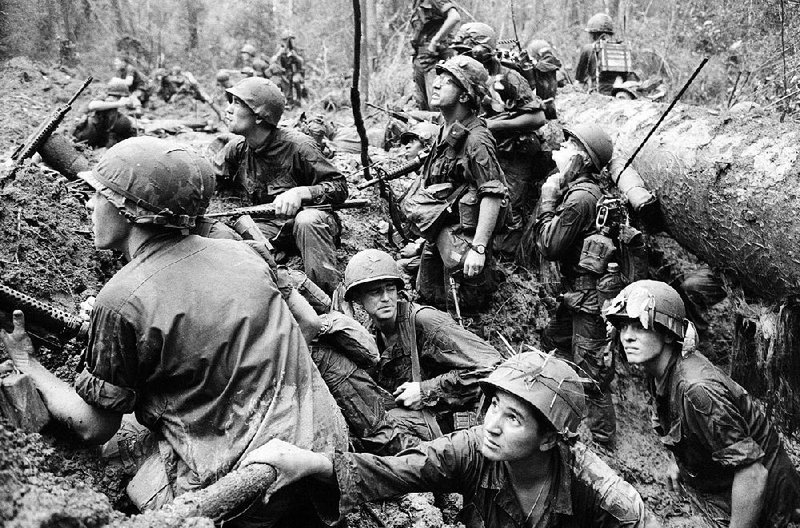Today we'll have an early preview of Ken Burns' latest contribution to our cultural edification because Sunday's column will be taken up with the Emmys.
Ten years in the making, The Vietnam War is a 10-part, 18-hour documentary series directed by Burns and Lynn Novick. It will air on PBS and AETN at 7 p.m. each night Sunday through Sept. 21, then Sept. 24 through Sept. 28.
I've seen almost all of it. It's gripping, balanced and, frankly, important. The series is a thorough and frequently painful look at one of the most divisive periods in American history -- a period about which many of us are still woefully ignorant.
The tagline: "There is no single truth in war."
Written by Emmy-winning historian and author Geoffrey C. Ward, the series uses remastered archival footage, photographs, television broadcasts, home movies and audio recordings from the Kennedy, Johnson and Nixon administrations. The Vietnam War reminds us just how complicated the entire affair was. And how hopeless.
More than 100 now-classic musical recordings will remind those of us of a certain age of our youth.
Most evocative, however, are the intimate first-person interviews from almost 80 witnesses -- and not just Americans. Some of the most poignant comments come from Vietnamese combatants from both sides, as well as civilians who suffered.
In my view, The Vietnam War is Burns' most impressive and important documentary to date. But I'm biased.
Full disclosure: Unlike Burns' seminal Baseball, Jazz and The Civil War, this one is personal. I spent 18 months during 1971 and 1972 at Thai support bases during the conflict. It was mostly luck that I found myself processing film in an Air Force photo lab instead of slogging through a rice paddy in Vietnam.
My last base in northeast Thailand coordinated the bombing of the Ho Chi Minh Trail in Laos. The war was just across the nearby Mekong River, but I was so insulated, it may as well have been a thousand miles away.
Why should we still care 42 years after the war ended? The Associated Press reported Burns' answer at the recent Television Critics Association summer press tour.
"I think this will be, for a general American audience, a kind of revelation ... and hopefully get everybody, regardless of political perspective, to let go of the baggage of the superficial and the conventional."
Burns added, "Human nature never changes, and Vietnam, particularly because we live in this stew of anger and recrimination, helps us understand the present moment."
And finally, Burns said, "We try super hard not to sort of put our thumb on the scale or to promote an agenda, political or otherwise. It's enough to spend 10 years just trying to wrestle this story to the ground, and we felt that it was hugely important because the story is rarely told from more than one perspective."
Here are the episodes and the time periods they cover. Reminder -- each begins at 7 p.m.
Sunday: Episode 1, "Deja Vu" (1858-1961). Ho Chi Minh and his revolutionaries end a century of French occupation. Vietnam is divided in two.
Monday: Episode 2, "Riding the Tiger " (1961-1963). President Kennedy wrestles with how much to get involved.
Tuesday: Episode 3, "The River Styx" (January 1964-December 1965). Hanoi hardliners increase the insurgency and President Johnson escalates America's involvement.
Wednesday: Episode 4, "Resolve" (January 1966-June 1967). Antiwar movements build at home.
Sept. 21: Episode 5, "This Is What We Do" (July 1967-December 1967). The American body count rises as Johnson assures the country that victory is near.
Sept. 24: Episode 6, "Things Fall Apart" (January-July 1968). North Vietnamese and Viet Cong stage bolder surprise attacks.
Sept. 25: Episode 7, "The Veneer of Civilization" (June 1968-May 1969). Public support for the war wanes. Nixon wins the White House.
Sept. 26: Episode 8, "The History of the World" (April 1969-May 1970). Morale plummets in Vietnam and Nixon begins a withdrawal.
Sept. 27: Episode 9, "A Disrespectful Loyalty," (May 1970-March 1973). U.S. air power halts North Vietnamese offensive operations and Hanoi agrees to a peace deal. American prisoners finally come home to a bitterly divided country.
Sept. 28: Episode 10, "The Weight of Memory," (March 1973-Onward). With America out of the war, South Vietnam collapses. The war ends when Saigon falls on April 30, 1975.
More than 58,000 Americans died, according to the National Archives. To give that a visual perspective, War Memorial Stadium in Little Rock seats 54,120.
The TV Column appears Sunday, Tuesday and Thursday. Email:
mstorey@arkansasonline.com
Weekend on 09/14/2017
